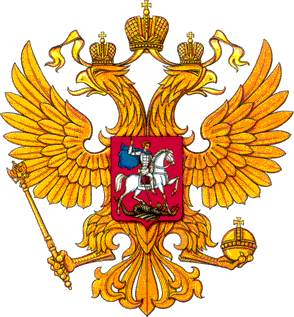
The coat of
arms of Russia
Le
Monde, France
The Danger to the West of Not 'Helping Russia'
"Obama has called for, 'a strong, peaceful and prosperous
Russia, occupying its rightful place as a great power,' and stated his belief
that, 'the days when empires could treat sovereign states as pieces on a chess
board are over.' How much we'd like to believe it! But can we?"
By
André Fontaine*

Translated
By Helene Grinsted
August
1, 2009
France - Le Monde - Original Article (French)
Brave,
a good fellow, cultivated, sporty, a model father and husband … ? Whether people
he unwittingly offends like it or not, Barack Obama is currently the most
influential and, in any case, most popular statesman on the planet. Therefore,
we need to pay great attention to what he says and does. And in particular, at
the time of his recent trip to Moscow, to the manner in which he called for, "a
strong, peaceful and prosperous Russia," occupying "its rightful
place as a great power," and stated his belief that, "the days when
empires could treat sovereign states as pieces on a chess board are over."

Can Western nations simultaneously help Putin's Russia and
make it safe for the West? Vladimir Putin shows off his vigor
on a trip to Siberia, August 4.
[CLICK HERE
OR CLICK PHOTO TO WATCH BBC VIDEO]
How
much we would like to believe it! But can we? Russia's recent interventions in
Chechnya and Georgia; Putin's statement to the effect that the collapse of the
USSR is the greatest catastrophe of the 20th century; his refusal to condemn Stalin's
crimes; the peace of mind with which he and the oligarchs have carved fortunes out
of the ruins of the Bolshevik state; the way in which he has dealt with the
Constitution to retain at least an element of power that has come to an end;
the murders of dissenting journalists - all this gives us the right to ask
ourselves the question.
U.S.
Secretary of State William
Seward [photo, right], who purchased Alaska from Russia in 1867, justified what many of
his countrymen called "folly" by assuring them that the country of
the Tsars "wants only what is good" for the United States and would
let them "conduct their affairs in the way they know how to ..." Half
a century later, President Wilson, in whose footsteps Obama walks in many respects,
assured Congress in the aftermath of the October Revolution that, "for
those who know her best, Russia's whole way of thinking has always been profoundly
democratic." This wasn't exactly Marx's view, according to which, "the
policy of Russia is changeless, as recognized by the official historian,
Muscovite Nikolay Karamzin." Its
methods, its tactics, its maneuvers may change, but the polar star of its
policy - global domination - is a fixed star." [translated quotes].
Throughout
two centuries, there have been innumerable greater and lesser minds who have
said the same thing. Beginning, of course, with the Marquis de Custine,
who in 1835 departed for a country in which he expected to find a good example
of the kind of quietly conservative society that he dreamed of for France, and
who in 1839, brought back with him, along with the manuscript of his book Russia,
an indictment against a, "nation, essentially aggressive, greedy under the
influence of privation, [that] expiates beforehand, by a debasing submission,
the design of exercising a tyranny over other nations … on his knees, the slave
dreams of dominating the world. One day the sleeping giant will arise and with
violence, will put an end to the tyranny of others." [translated quote.] The
Slavophiles, such as Herzen, Dostoyevsky and Belinsky,
glorified this destiny.
[Editor's
Note: The Slavophiles were
part of a movement that wanted the Russian Empire to develop based on the
values and institutions of its earlier history].
At
the end of his book Dead Souls, Gogol wrote, "And you,
Russia of mine, are not you speeding like a troika that naught can overtake? … Whither,
then, are you speeding, O Russia of mine? Whither? Answer me! But no answer comes
- only the weird sound of your collar bells. Rent into a thousand shreds, the
air roars past you, for you are overtaking the whole world, and shall one day
force all nations, all empires, to stand aside, to give you way!" Nikolai Berdyaev in The
Origin of Russian Communism, which first appeared in France in 1951
[English in 1955], was quick to write that Bolshevism was nothing less than, "the
synthesis of Ivan the Terrible and Marx."
Posted by
WORLDMEETS.US

This
is obviously no longer the case, but we know that quite a few Russians find it
difficult to live with their country's lost power. In 1945, thanks to Stalin
and the 20 million Soviets who died in World War II, Russia had regained its pre-1914
borders. But now, once again, it is without access to warm seas, encircled by
often hostile states - either already members of NATO or candidates for membership.
Meanwhile, the Warsaw Pact has been dissolved, something that naturally irritates
the Russian military, to whom the President Dmitri Medvedev announced on March 17
that, "confronted with NATO," Russia would have to rearm beginning in
2011. The transport of gas and oil, Russia's main resources, pose a constant
problem. So-called communist China, at one time a satellite of Stalin's USSR,
has become the world's number two power, closely tied to the economic interests
of the United States.
The
Russian giant is facing decline in every area, starting with the dramatically
falling birth rate. Extending over 6.5 million square miles - compared to
little more than 3.4 million square miles for the United States, Canada or
China - and spanning 11 time zones, it remains by far the largest country in
the world. But it's a long way from being the most populous - the United States
having twice as many inhabitants. The prevalence of alcoholism, smoking and
criminality reflect a fairly general gloom. Where will it end? No one is
interested in seeing a new page written on what Hélène
Carrère d'Encausse has called, The Russian Syndrome - One Thousand Years
of Political Murder. We must help this great nation.
*André
Fontaine is a former director of Le Monde.
CLICK HERE FOR FRENCH VERSION
[Posted by
WORLDMEETS.US August 6, 4:59pm]